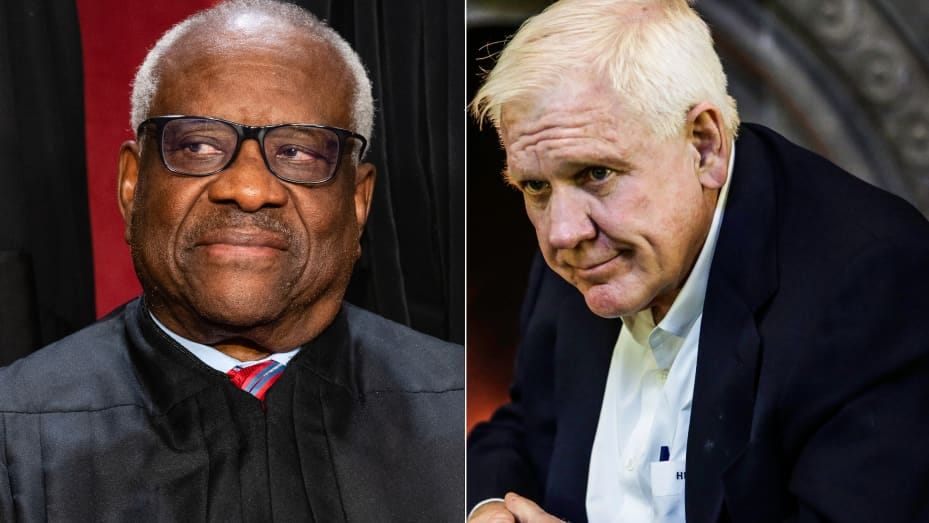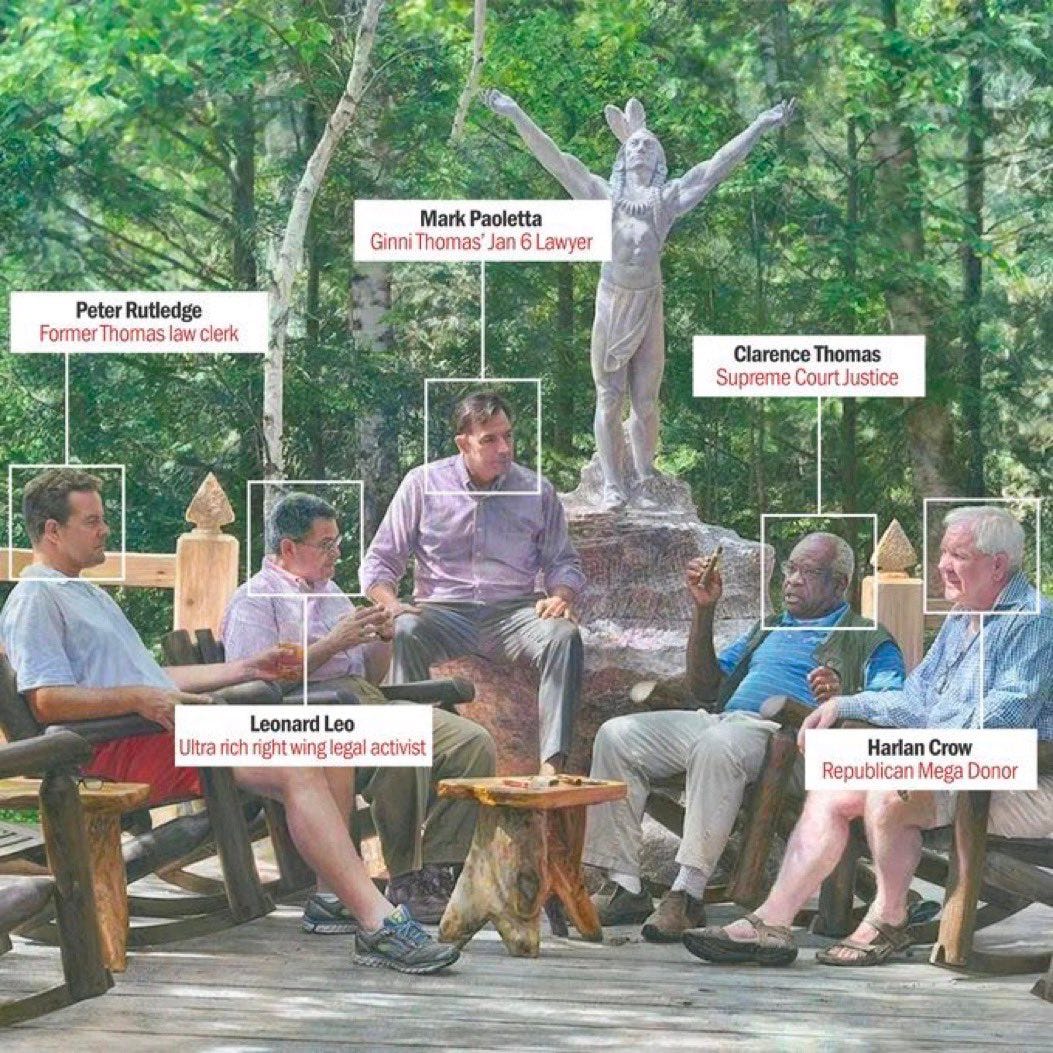Another blockbuster story has thrust embattled Justice Clarence Thomas back in the national spotlight. ProPublica reported on Thursday morning that billionaire Harlan Crow had paid the hefty private school tuition bill for Thomas’s great nephew, Mark Martin. The Thomases had taken legal custody of Martin at age six and were “raising him as a son.”
The revelation adds to the Thomases’ already too-cozy relationship with the real estate magnate. Earlier reporting by ProPublica had revealed that they had enjoyed luxury trips at Crow’s expense and that Crow had purchased the home of Justice Thomas’s mother, where she still lives rent-free.
The tuition payments raise further ethical and legal questions around the Thomases’ relationship with Crow and further undermine confidence in his seat on the Supreme Court, which increasingly appears to have been for sale. Let’s take a closer look at the newly unearthed tuition scandal and how the Thomases’ allies are seeking to explain and defend the payments.
That’s a lot of tuition money, Clarence.
According to bank statements of the Hidden Lake Academy, which were made public in an unrelated matter, Crow’s company paid Mark Martin’s tuition directly to the school for the entire time Martin was there, with a cost of upwards of $6,000 per month.
“Harlan picked up the tab,” said Christopher Grimwood, a former administrator, who had known both Crow and the Thomases and had access to school financial information. Crow also paid Martin’s tuition at a second boarding school, Randolph-Mason Academy in Virginia, according to Grimwood, who recalled Crow mentioning this in conversation.
The total price tag for both schools isn’t readily clear. But based on the time Martin spent at each, it may have exceeded $150,000.
And here’s the really damning fact: Thomas did not list the tuition payments by Crow on his annual disclosures, even though he did disclose a $5,000 gift for Martin’s education from another friend. In other words, it appears Thomas knew that he had an ethical or legal obligation to disclose the gift, given that he was the legal guardian and Martin had received something of value.
This raises at least one obvious question that rather answers itself: Did Thomas hide Crow’s support because he knew how it would look?
Thomas declined to answer questions from ProPublica about the tuition gifts from Crow. But Crow did release a response in a statement, which did not deny that the tuition gifts occurred.
“Harlan Crow has long been passionate about the importance of quality education and giving back to those less fortunate, especially at-risk youth,” the statement read. “It’s disappointing that those with partisan political interests would try to turn helping at-risk youth with tuition assistance into something nefarious or political.” Crow added that he and his wife have “supported many young Americans” at a “variety of schools, including his alma mater,” referring to Randolph-Macon Academy.
Leave Martin alone! And the Thomases, too!
Mark Martin is 30 years old now, but to hear the Thomases’ allies put it, journalists need to respect his privacy and not impugn the Thomases for having helped a child in need for twelve years.
According to Mark Paoletta, a friend of Justice Thomas (who is also the attorney for Ginni Thomas), there is nothing but love and support to this touching story. Paoletta’s statement is really quite something:
Justice Thomas and his wife made immeasurable personal and financial sacrifices and poured every ounce of their lives and hearts into giving their great nephew a chance to succeed. In the summer of 2006, the Thomases were struggling to find a school where they could send their great nephew. In discussing these challenges with their dear friends, Harlan and Kathy Crow, Harlan recommended that the Thomases consider one more option: sending their great nephew to Randolph Macon Academy. Harlan had attended Randolph Macon, and he thought the school would be a good fit.
Paoletta goes on to argue that there is no legal requirement for disclosure.
Harlan Crow’s tuition payments made directly to these schools on behalf of Justice Thomas’s great nephew did not constitute a reportable gift. Justice Thomas was not required to disclose the tuition payments made directly to Randolph Macon and the Georgia school on behalf of his great nephew because the definition of a “dependent child” under the Ethics in Government Act (5 U.S.C. 13101 (2)) does not include a “great nephew.” It is limited to a “son, daughter, stepson or stepdaughter.” Justice Thomas never asked Harlan Crow to pay for his great nephew’s tuition. And neither Harlan Crow, nor his company, had any business before the Supreme Court.
This glosses over a few key facts. Before I get into them, it’s worth noting that Paoletta is apparently the guy in this portrait of Harlan Crow and his guests, which included billionaire judicial activist Leonard Leo and Justice Thomas, while on one of those luxury get-aways:
Now, about those facts.
First, the Thomases were the legal guardians of Martin, and they were “raising him as a son.” It isn’t at all clear that you can skirt disclosure requirements for someone who is actually your legal ward.
Second, Thomas reported a gift on behalf of Martin’s education from another friend, indicating that at least on some level Thomas understood that there was a disclosure requirement. Just somehow not for Harlan Crow’s money.
Third, Crow was hardly doing this out of the goodness of his heart because he had no “business” before the Court. In fact, he was deeply invested in the outcome of key cases before the Court.
On top of the luxury trips, family real estate purchases and six figure tuition support—what an incredibly generous man!—Crow gave $500,000 to help start a site called “Liberty Central,” created by Ginni Thomas. That was just months before the Citizens United decision came down from the Court, in which Thomas cast a decisive vote with the 5-4 majority.
Americans for Tax Fairness, a progressive advocacy organization that wants corporations and billionaires to pay their fair share of taxes, noted that Harlan Crow’s and his family’s yearly political contributions went up 862 percent after Citizens United, exceeding $4 million in two of the subsequent years.
As Rep. Ted Lieu (D-CA) succinctly noted, it is not just the apparent corruption that is troubling. It is the indisputable and crushing destruction of public confidence in Thomas that should now require him to step down:
Crow sits on the board of AEI, which lobbies against tax hikes on billionaires and writes briefs to Justice Thomas. Crow lavished millions in gifts on Thomas. Is this corrupt? Probably.
Does it have the appearance of corruption? Absolutely.
Justice Thomas needs to resign.
The tuition payments and under-the-table property deals benefitting the Thomases and their relatives reminds me of another arrangement that has been in the news lately: the Trump Organization’s use of $1.7 million in off-the-book perks (free apartments, cars, tuition payments) to help secure the loyalty of its CFO, Allen Weisselberg. These perks were not only illegal, they bound Weisselberg to the Trump Organization. By participating in the 15-year scheme, Weisselberg was now a party to a tax fraud conspiracy and would go down if the company went down. Weisselberg did in fact go to prison for that crime, and the Trump Organization was found guilty of 17 counts of tax fraud.
Off-the-book corporate perks are a nifty way to purchase and enforce loyalty, and Harlan Crow’s lavish subsidies to the Thomases are no different. Crow absolutely knew what his money was buying, and there is no doubt Thomas knew what he had to do to return the favors.
Our system, unfortunately, does not have a mechanism to remove Supreme Court justices except by way of impeachment and conviction. In any functional system, these ethical and perhaps even legal breaches would be more than enough to force Thomas to step down, on pain of impeachment by the House and removal by the Senate. Instead, the GOP continues to protect Justice Thomas and the corrupt pay-to-play system he helped lock in place.
This means that any solution must be a political one. Voters must exact a political price for this kind of outrageous corruption and those who refuse to act to stop it. Our obligation as citizens is therefore clear: We must continue to keep this scandal in the spotlight, to demand Senate hearings, and to continue to educate our fellow citizens about how dangerous it is to allow big money to buy the Court.
There is a secondary but important deterrent effect. We may not be able to remove Justice Thomas in our lifetimes. But justices and federal judges are now on notice that the press and the public will demand transparency and will scrutinize all their personal records to root out corruption. The hope is that future appointees will be vetted far more thoroughly, and the current Court members will understand that they can no longer sit comfortably in the pockets of billionaires without it coming to light.
* * *
If you appreciate my daily writings and social media updates, you can show your support by taking out a paid subscription to this newsletter. I depend entirely on voluntary contributions to keep this work going. If you can afford to help out, I would be so grateful. Thank you. — Jay






And then there’s the mysterious disappearance of Kavanaugh’s credit cards. #brettsdebts
I am wondering why the IRS isn’t interested in these gifts? Shouldn’t the Thomases owe taxes on these? They represent unreported income in my way of thinking.